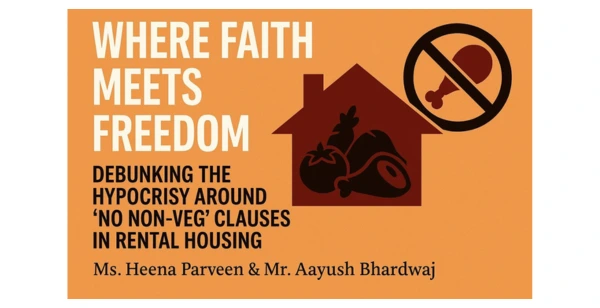
Vegetarian-Only Housing India: Truth Behind the Trend
Where Faith Meets Freedom: Debunking the Hypocrisy Around ‘No Non-Veg’ Clauses in Rental Housing
By- Ms. Heena Parveen & Mr. Aayush Bhardwaj
In the ever-complex tapestry of Indian pluralism, where constitutional rights jostle daily with deeply embedded cultural and religious practices, a curious controversy has emerged. When a landlord — citing religious observance — sets a dietary restriction within their own private premises, it is suddenly branded as casteist, exclusionary, and regressive.
Yet, such sweeping judgments miss the nuance, trample over constitutional intent, and reveal an uncomfortable truth: what masquerades as progressivism today often smells strongly of selective outrage.
At the heart of the matter is this: a landlord refuses tenancy that involves cooking or consuming non- vegetarian food within a rented premise, citing the sanctity of religious practices or presence of a home shrine.
There is no mention of caste, religion, or identity — only a dietary clause, applicable to all. Still, the self-styled custodians of social justice raise their pitchforks.
They cry foul. But one must ask — is this truly discrimination, or simply the exercise of a constitutionally protected belief system within one’s own home?
A Constitutional and Cultural Reality
The Indian Constitution does not favour one right over another; it harmonizes them. Article 25 guarantees the freedom to practice and propagate one’s religion. Article 300A affirms the right to hold and enjoy property.
If a landlord, inspired by spiritual discipline, restricts the kind of food that may be prepared within their property — and does so uniformly — it is not a casteist act. It is a constitutionally protected choice.
Courts have acknowledged this balance. In Zoroastrian Cooperative Housing Society v. District Registrar (2005), the Supreme Court upheld the right of religious housing societies to set norms reflective of shared ethos.
The Bombay High Court has also repeatedly held that vegetarian-only clauses, when uniformly imposed and not based on personal identity, do not amount to unlawful discrimination.
The Theatre of Hypocrisy
However, what makes this debate troubling is not the legal question — it is the intellectual dishonesty of many who participate in it. The same voices that champion the right to individual choice and religious freedom turn their backs on those very principles when the beliefs in question do not align with their ideological template.
This hypocrisy wears many faces. Housing complexes proudly advertise “vegetarian- only” apartments. Private clubs restrict entry based on arbitrary codes. Religious dietary rules govern food choices across hostels, institutions, and communities.
Yet, no protests erupt. It is only when a small landlord — perhaps a devout household — sets boundaries rooted in belief that the wolves in activist wool emerge, masquerading outrage as empathy.
What they truly oppose is not exclusion — but expression.
Not Every Boundary is Bigotry
Discrimination based on caste or religion is real, repugnant, and deserves unequivocal condemnation. But to conflate a dietary preference rooted in devotion with casteism is an error both factual and moral.
A “no non-veg” rule, when applied across caste and community lines, is a matter of conscience, not of caste. According to the National Family Health Survey (NFHS-5, 2019–21), nearly four out of ten Indians (39%) are vegetarians, with this number rising significantly in states like Rajasthan, Gujarat, and among urban upper-caste communities.
In fact, Jains (96%) and Brahmins (45%) are among the most devout vegetarians—where the consumption of even onion and garlic is avoided due to spiritual reasons. In cities like Mumbai, Ahmedabad, and parts of South Delhi, there are dozens of housing societies officially designated as “vegetarian-only” — not as a tool of exclusion, but as a reflection of shared spiritual lifestyles. This is not oppression — it is ethos expressed in living practice.
One must ask: if a temple can request all to remove their shoes before entry, is it not equally reasonable for a devout Hindu household to request that meat not be brought into the kitchen? Purity is not prejudice when applied with parity.
The Essence of True Coexistence
India’s greatness lies not in uniformity, but in its complex accommodation of differences. To coexist is not to erase difference but to respect boundaries — to understand that my freedom to eat ends where your freedom to worship begins.
Those who denounce such religiously-informed clauses as backward forget that liberty, too, is a dialogue
— not a dictate. If we wish to honour the Constitution, we must do so in full — not in fragments that serve ideological preferences.
Let us, therefore, reject this culture of selective morality and recognise a simple truth: when we protect
someone’s altar, we don’t diminish liberty — we uphold it.




